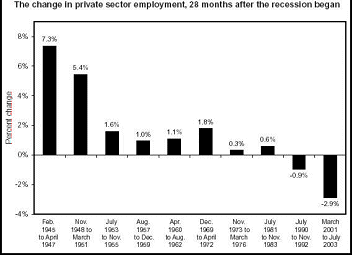In LABOR MARKET LEFT BEHIND the current data are analyzed and problems hidden behind the numbers are discussed. “For too many working families, the current recovery is indistinguishable from the recession,” Bernstein said. “Recent signals suggest growth will improve in the second half of the year, but even optimistic forecasts for unemployment hover around 6%. In other words, we’re looking at little if any improvement in unemployment for at least the rest of this year.”
Among the findings Bernstein and Mishel discuss are these:
1) In terms of employment growth, the current recovery is the worst on record since the Bureau of Labor Statistics began tracking employment in 1939. Employment is down over one million since the recovery began. Adding in the job losses from the actual recession, payrolls are down by 2.7 million overall—3.2 million in the private sector—making this the worst hiring slump since the Great Depression.Although the recent recession was officially declared over as of November 2001, on Labor Day 2003 the job market remains decidedly weak. Unemployment is high and, instead of coming down in the nascent recovery, it has climbed from 5.6% at the recession’s end to 6.2% in July 2003 (the most recent data available). Tracking the nation’s payrolls reveals the worst hiring slump since the Great Depression. And the weak labor market is not just a problem for those without jobs—wages have been growing more slowly for most workers and even falling in real terms for some.
2) Even if predictions of stronger growth in the second half of 2003 prove accurate, unemployment will stay near 6% through most of 2004.
3) During this recovery, unemployment has risen 0.6 percentage points overall and 1.3 points among African Americans.
4) Real wages of the typical (median-wage) worker, which grew about 2% more than inflation through 2001, stopped growing entirely in 2002.
5) This is only the second recovery since World War II in which unemployment has not yet started to fall this many months into recovery.
6) Employment opportunities have declined more for college graduates than for high school dropouts.
7) Underemployed workers – those working fewer hours that they want to or in a job for which they are overqualified – reached double digits (10.2%) in July 2003.
How could it be that the nation’s economy is supposedly in recovery, yet the job market is much weaker now than when the recession ended? The explanation has something to do with the criteria used to determine when a recession ends, but the main point is that, although the economy is expanding, it is doing so at too slow a rate to lower unemployment quickly or to generate the needed job growth.

Over the past few years, the Bush Administration and Congress have passed numerous tax cuts purportedly intended to stimulate the weak economy and restart the engine of job creation that was delivering 241,000 jobs per month, on average, between 1995 and 2000, a stark contrast to an average loss of 93,000 jobs a month since March 2001. Thus far, these tax cuts have failed to lower unemployment, much less stimulate private sector job growth. In fact, hundreds of economists, including 10 Nobel laureates, argued that these cuts were poorly structured as a stimulus. George A. Akerlof Nobel Laureate in Economics is one of those ten.
OPEN SOURCE POLITICS has some great reading today. Part II of the Progressive Prescription continues Jeff Alworth's excellent essay on the history of Liberals V. Conservatives during the Reagan years. Lilith C. Devlin's LABOR DAY'S FORGOTTEN ONES remembers that over 150,000 Americans spent August in the sand but not on the beach or golfing in Texas. Jeremy Puma shows us the new face of unions in The Washington Alliance of Technology Workers, and if you don't get enough of me here the Rush Limbaughtomy entry is Cooked with Gas and Boiled in Oil
No comments:
Post a Comment